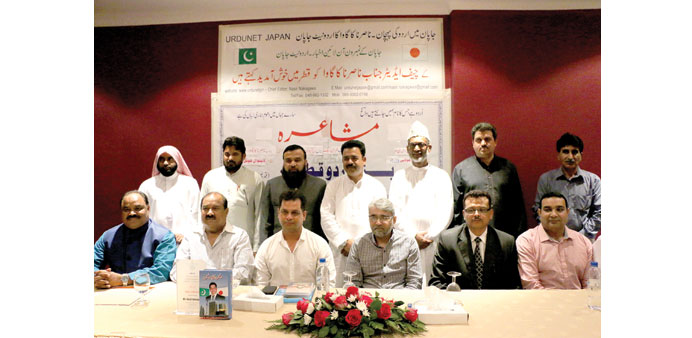By Umer Nangiana
The oldest community organisation of Pakistani expatriates, Bazm-e-Urdu Qatar (BUQ), saw off their foreign guest from Japan in the style they know the best, poetry. Local poets and members of Pakistani and Indian community came together to hold a poetry recital here to give a farewell to Nasir Nakagawa, the prominent journalist from Japan, at the conclusion of his two-day trip to Doha.
Many prominent local Urdu poets presented their latest poems and ghazals at the occasion where Nakagawa also launched his book Des Bana Perdes (Home away from Home).
Rashid Nizam, the Cultural Attaché of Pakistan Embassy in Qatar, was the chief guest at the ceremony held at Lietval Hotel. The book launch and poetry recital was followed by a dinner for the guests.
Nakagawa thanked the hosts for giving him a warm welcome on his first visit to Qatar. He is the chief editor of urdunetjpn.com, an online news network that is viewed by Urdu speaking audiences in over 50 countries.
“My book is a compilation of essays that I have penned over the years on different topics about life in Japan and particularly issues pertaining to the interests of Pakistani diaspora in the country. Most Pakistanis living in Japan cannot read the Japanese language, though most of them can speak it,” Nakagawa told Community while speaking about his book, printed and published from Pakistan in Urdu.
“Therefore, I translate different articles of their interest from the Japanese newspapers and put them on my website. During the course of such translations, I have also written essays on a range of topics with a particular focus on Japanese culture and traditions, and their ways of life. It helps the expatriates living there to better understand the local culture and life,” he added.
For instance, Nakagawa in his book has tried to orientate the expatriate Pakistani community on Japanese healthy lifestyle and their eating habits. The Japanese people scarcely use oil for cooking their food. All Japanese eat fish every day, sometimes twice or even thrice a day. And they use vegetables in abundance. Both of these are good for health. They always take a bath with warm water before going to sleep in the night. All this keeps them healthy and fit. The books contain essay on all such topics.
“They do regular exercise and walk. And almost everybody has a cycle there even if they own cars. Every individual in every household will have a car and a bicycle. You would never see them locking their cars but they put locks on their bikes to save them from being lifted by street boys who ride them for fun and leave them at some distance away from the owner’s house,” explained Nakagawa.
He moved to Japan when he was 24, with an undergraduate degree in commerce. He has been there 27 years now and took up Japanese citizenship a long time ago.
The Japanese, he said, are proud of their values and they display unity at all levels. Every Japanese citizen is first and foremost a Japanese, whether he is living in Tokyo, Osaka or any other place in the country.
“My essays cover, among other things, cultural topics such as traditional Japanese weddings and their death rites. I have also written on the Japanese tax and pensions system,” said the writer.
“I have also written essays on the Japanese system of governance and what makes the Japanese people such a prosperous and happy nation,” he added. He has also touched on the topic of high suicide rate in Japan in his essays.
His book also includes essays on Japan’s immigration system and how you can get Japanese nationality. He has written all these articles in Urdu for the understanding of Pakistani community living in Japan.
His website, he said, is viewed by expatriate communities living in more than 50 countries. “I have connections with people in all these countries including UAE, Qatar, Indonesia, Malaysia, Europe, USA and many other countries.
“I now have good command over Japanese language and I have learnt it all while staying there. Before moving to Japan in the late 80s, I was working with a Japanese company in Pakistan so I had some orientation with Japanese language. But I mainly learnt it in Japan,” recalled Nakagawa.
Most Pakistanis, he said, came to Japan for jobs but now over 80 percent of them have their own businesses. Some of them are doing so well that they now employ local Japanese employees, said the Japanese national.
Bazm President Syed Faheemud Din thanked the guest for visiting Qatar and spending time with Pakistani community. Shaukat Ali Naz, the adviser to Bazm, recited his latest poems to bid farewell to the guest.

SPEECH: Nasir Nakagawa addressing the audience at the mushaira.
